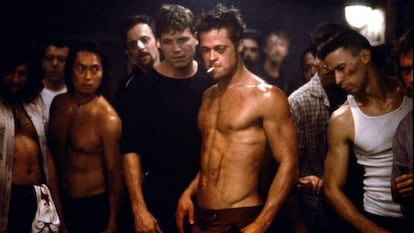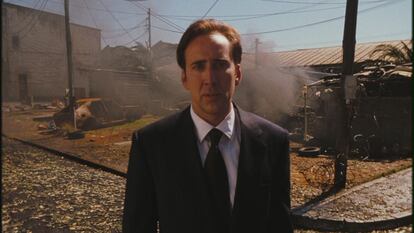Rule number one of ‘Fight Club’ in China: The police always win
The Chinese streaming version of David Fincher’s 1999 cult classic has a different ending to satisfy the country’s censors


The first rule of Fight Club in China is that the police always beat the criminals. The second rule is that buildings are not demolished. And the third is that if the ending is considered unsuitable, change it.
David Fincher’s 1999 cult film, which was shown just once in Chinese theaters during an edition of the Shanghai Film Festival, is now available on tech giant Tencent’s streaming services in China. But with a different outcome. Warning this article contains spoilers.
In the original, the narrator, played by Edward Norton, has just “killed” his imaginary alter ego, Tyler Durden, played by Brad Pitt, and watches the explosion of several nearby buildings with his girlfriend Maria, played by Helena Bonham-Carter. The anarchist revolution advocated by Durden is underway.
In Tencent’s version, on the other hand, there are no explosions and no scenes of Tyler and Maria holding hands as they watch the destruction. Instead, the screen turns black and writing appears, explaining that the police “arrested all the criminals, successfully preventing the bomb from exploding.” According to this alternative ending, Durden is sent to a psychiatric hospital, from which he is released in 2012. Screenshots of the new ending went viral last weekend in China, with comments mocking the changes. Although the film was shown just briefly in movie theaters, many fans have been able to watch pirated versions of the original over the past two decades, and considered the ending one of the film’s fortes.
“When a director comes to present his film in China, people will ask: director, why is your film so avant-garde that it completely dispenses with audiovisual language, ending it instead with just a poster and a story about respecting the law? Is it a satire on censorship in your country? And the director will answer: What? I filmed that?” wrote one user of Weibo, the Chinese version of Twitter. “Probably everyone in Ocean’s Eleven would also get arrested. And the whole Godfather family, too,” scoffed another. “But the ending was great! A bunch of foreigners in a terrible situation setting off terrorist bombs – a perfect scene to encourage [Chinese] nationalism,” joked another.

It is unclear whether it was Tencent or the film’s original producers who made the changes. On the Chinese movie review platform Douban, the original film is rated nine out of 10 and has 744,000 comments.
China currently has a flourishing movie market, one in which just over 30 foreign films are released on the big screen each year. In fact, it overtook the US market for the first time in 2020, due in part to a quicker recovery from the pandemic. And, according to research portal researchandmarkets.com, it is expected to gross $16.5 billion by 2026, annual growth of 30.1%, with respect to the $3.4 billion in 2020.
Within this market, Fight Club is not the only Hollywood movie to be changed. In 2019, scenes from Bohemian Rhapsody that alluded to Freddie Mercury’s homosexuality were carefully cut out in the Chinese version. While same-sex relationships are not illegal in the world’s second-largest economy, it is considered a sensitive issue and scenes portraying it are often, but not always, removed. Theoretically, they have been banned on television and also on streaming platforms since 2017.

Lord of War (2005) endured a similar fate to that of Fight Club. In its original version, the main character, an arms dealer played by Nicholas Cage, manages to escape prison and resume business. The film alludes to the fact that the five permanent members of the UN Security Council – the US, the United Kingdom, France, Russia and China – are the planet’s main arms dealers. But the version for the Chinese market, which is half an hour shorter than the international version, removes the original ending and replaces it with a text stating that the Cage “confessed to all the crimes of which he was officially accused during the trial, and was sentenced to life imprisonment.”
Tu suscripción se está usando en otro dispositivo
¿Quieres añadir otro usuario a tu suscripción?
Si continúas leyendo en este dispositivo, no se podrá leer en el otro.
FlechaTu suscripción se está usando en otro dispositivo y solo puedes acceder a EL PAÍS desde un dispositivo a la vez.
Si quieres compartir tu cuenta, cambia tu suscripción a la modalidad Premium, así podrás añadir otro usuario. Cada uno accederá con su propia cuenta de email, lo que os permitirá personalizar vuestra experiencia en EL PAÍS.
¿Tienes una suscripción de empresa? Accede aquí para contratar más cuentas.
En el caso de no saber quién está usando tu cuenta, te recomendamos cambiar tu contraseña aquí.
Si decides continuar compartiendo tu cuenta, este mensaje se mostrará en tu dispositivo y en el de la otra persona que está usando tu cuenta de forma indefinida, afectando a tu experiencia de lectura. Puedes consultar aquí los términos y condiciones de la suscripción digital.








































